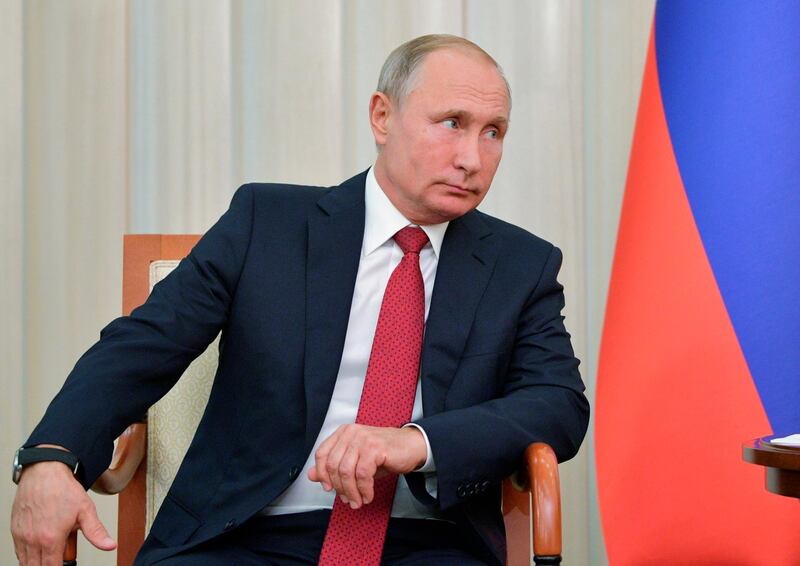India will sign a deal this week to buy Russian air defence systems, running the risk of invoking US sanctions barely a month after a Pentagon official warned New Delhi about arms deals with Moscow.
The deal will be signed when President Vladimir Putin visits New Delhi on Thursday and Friday, as part of an annual summit between India and Russia.
“The key feature of this visit will be the signing of the agreement to deliver S-400 air defence systems,” Yury Ushakov, Mr Putin’s foreign policy aide, said to Agence France-Presse. “The value of the contract will be more than $5 billion.”
India is the world’s largest importer of arms, and is Russia’s biggest customer.
By value, Russia provides India 60 per cent of its defence imports—a figure that has declined from 79 per cent in 2008-12, according to statistics maintained by the Stockholm International Peace Research Institute.
The S-400 system, which packs a battery of four missiles, is an anti-aircraft system that has been used by the Russian army for a decade now. India has been interested in purchasing S-400 units since 2015, and the deal will involve a sale of five units.
But the systems are proscribed under a US law called Countering America’s Adversaries through Sanctions Act (CAATSA), which was signed by President Donald Trump in August 2017, as part of a batch of sanctions on Iran, Russia and North Korea.
Since the law was passed, the US has shown its intent to act on it.
_________
Read more:
Russian air defences will complicate Syria's crowded skies
India's hunt for gas involves search for shorter deals
[ Indian duty increases on imports divide a nation grappling with a weak rupee ]
_________
Last month, the US State Department announced sanctions on China’s Equipment Development Department, an arm of its military, in retaliation for China’s purchase of SU-35 combat aircraft and S-400 systems from Russia.
The US has also expressed repeated concern over Turkey’s plans to purchase S-400 units from Russia, and has considered cancelling a sale of US-made F-35s if the Turkey-Russia deal goes through.
India will hope for a waiver from such sanctions, and there is precedent for such hope.
In 2013, the US granted waivers to India and a handful of other nations so that they could continue importing oil from Iran, despite sanctions that were already in place.
But Mr Trump’s government is more insistent that no country flout its regime of sanctions. Last month, Mike Pompeo, the US secretary of state, said in New Delhi that although waivers for Iranian oil will be considered, India must eventually stop buying any oil from Iran at all.
Following Mr Pompeo’s visit, Bloomberg reported that India’s state-owned oil importers planned to buy no Iranian oil at all in November. This year, India has been the second-largest purchaser of oil from Iran.
No laxity will be forthcoming on the S-400 systems either, if Mr Trump’s government is to be believed.
In a speech to the Carnegie Endowment for International Peace in Washington DC in August, Randall Schriver, the assistant secretary of defence for Asian and Pacific security affairs, confirmed that the president can indeed grant waivers in special cases. One such case, for example, would be if a country is still in the process of replacing its Russian-made arms with Western-made equipment.
But the existence of these waivers, Mr Schriver said, had led India to believe that it would be protected “from any fallout from this [CAATSA] legislation no matter what they do.”
“I would say that’s a bit misleading,” he said.
“We would still have very significant concerns if India pursued major new [Russian] platforms and systems,” Mr Schriver added. “I can’t sit here and tell you that they would be exempt, that we would use that waiver.”
Calling the intended deal to buy S-400s “troubling,” he said: “Our strong preference…is to seek alternatives and see if we could be a partner to India in addressing those defence needs.”
Separately, another American official, speaking anonymously to the Press Trust of India two weeks ago, called the S-400s deal “a significant transaction” and urged India to “think twice about [its] engagement with the Russian defence and intelligence sectors.”
But Russia is still India’s most important defence partner, said Sushant Singh, a New Delhi-based defence analyst and a former lieutenant colonel in the Indian army.
“To focus too much on the Americans is to ignore the Russian angle,” Mr Singh said. “India is heavily dependent on Russian spares and ammunition, which gives them leverage over us. It’s difficult for India not to take cognizance of that.”





